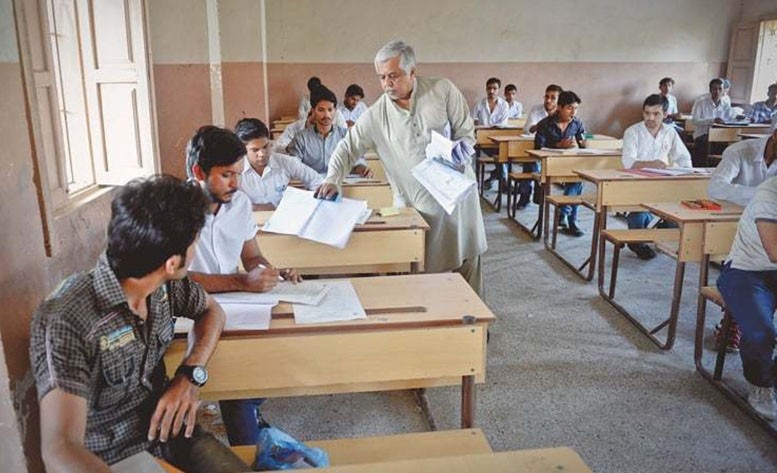
The different malpractices in board exams need to be addressed on an emergency basis to stem the rot

While the harbingers of ‘change’ make us believe that we are now in the time zone of a new Pakistan, many older maladies seem to persist. Cheating in our board examinations is one indicator. This grave misconduct is not limited to Sindh or some other province alone. During the Secondary School Certificate (SSC) examinations in Islamabad on April 8, 2019, a ninth grader attacked an invigilator with a sharp object when he recovered written notes from the pupil’s possession. The person almost lost eyesight.
Despite the pronounced corrective actions and attempts by the administration, many more cases of cheating and using unfair means during SSC examination were reported. The vigilance teams of various bodies and offices continued to detect those involved in such appalling practices. But it is believed that the scale of actual crime was much broader than the unveiled instances in different operations.
The administrative machinery did not rise up to the desired level of efficiency in a grave situation faced during the past few weeks. This is a serious issue that the government needs to address to save the edifice of school education from complete collapse. These instances of cheating are observed in school examination. One is horrified to imagine more serious instances of using unfair means in the upcoming Higher Secondary Board examinations, which will be held across the country soon.
The examination boards in many parts of the country have reportedly supported many malpractices. Common types of irregularities include leakage of question papers to chosen candidates; admission of fake candidates in the examination premises; facilitation of copying from books/notes uninterrupted; change of answer books; change of seat numbers on the answer books; manipulation in the allocation of examination centres; secret usage of mobile phones to obtain prompting from outside sources; harassment of innocent students by invigilators (to pay bribes); malpractice in checking and totaling and even in the preparation of final result sheets. During crackdowns, a few heads roll but the system soon returns to ‘normal’. No wonder that more and more students opt for international educational options available in the country.
As a norm, examinations are conducted to test the level of attainment amongst students with respect to a prescribed curriculum. Where the syllabus has been efficiently covered and corresponding preparations are done by the recipient students, the fear of examination of any kind does not arise. Teachers ensure that lessons have been well absorbed, adequate internal preparations done and also verified through a mechanism of class tests and preliminary mock examinations conducted in the schools. This was the prevailing practice about two decades ago.
However, there has been a sharp decline in the follow up of most essential routines. Educational standards in ordinary schools, both in public and private sector, have fallen sharply. The selection and appointment of school teachers is probably the most significant part of the malady. In the case of public sector, political favourites are chosen instead of merit and teaching capabilities.
Despite acquiring the services of an independent testing service, not much change in performance and outcome has been found. In private sector, the managements search for under-qualified and inexperienced teachers who could stay contented at meager emoluments. As a result, the fundamental process of teaching suffers. For the teeming number of middle class children, the tuition centres become the answer, most of which specialise in imparting gimmicks about scoring high in examinations -- not education itself. Unless highest care is applied in raising the standards of school teachers, very little improvement can be expected.
The next stage is the value system that leads to corrupt practices. If school teachers who believe and practice honesty of purpose and application are inducted in the teaching profession, they shall mould the morals of their pupils in the same frame. Such people may be difficult, not impossible, to find. An innovative and liberal approach is required from those who call the shots in this vital sector. Countless studies and appraisal reports have been prepared by various commissions and individuals on the subject. The few common threads that run through them demand appointment of school teachers through competitive examinations and interviewing process. Thereafter, the selection process may be devised to pick those with the right frame of mind and knowledge base.
Many reputable institutions in the welfare and private sector can be entrusted to do this work for public sector outfits. A revised package of emoluments and service conditions can make it a practically viable exercise. A contented and capable teacher can certainly structure the morals of his students on firm footings.
At present, the examinations at the SSC level, focus on testing the memory of pupils -- not the real attainment. This aspect needs reform. Ensuring a leak-free exam paper at assorted centres, transparent checking, honest tabulation and properly compiled results can lead to the resurrection of lost prestige of the board.
At the same time, the public boards can contemplate to conduct preliminary examinations at the Class V level to establish the strengths and weaknesses of students in schools. A broad based data bank and research wing also needs to be set up in order to scientifically document and analyse the data pertinent to education and examinations at various levels.
The lost credibility of educational structure and examination process must be restored. The public sector colleges/higher secondary educational institutions, universities and employers accept SSC as the baseline qualification. If redeeming measures are not taken to stem the rot, the public system of education will lose credibility among the relevant stakeholders and beyond.